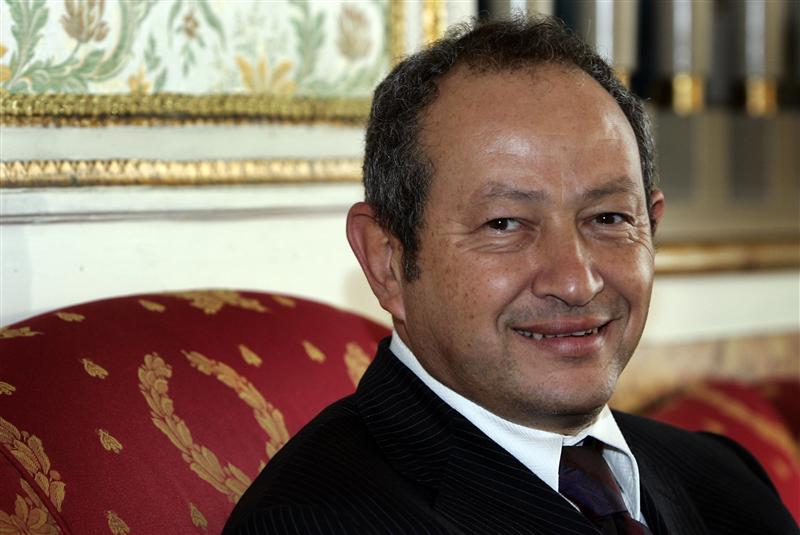Latest NEWS
- Aswat Masriya, the last word
- Roundup of Egypt's press headlines on March 15, 2017
- Roundup of Egypt's press headlines on March 14, 2017
- Former Egyptian President Hosni Mubarak to be released: lawyer
- Roundup of Egypt's press headlines on March 13, 2017
- Egypt's capital set to grow by half a million in 2017
- Egypt's wheat reserves to double with start of harvest -supply min
- Roundup of Egypt's press headlines on March 12, 2017
Naguib Sawiris pays a heavy price investing in North Korea

Egyptian businessman Naguib Sawiris smiles before a news conference in downtown Rome September 12, 2005. REUTERS/Alessandro Bianchi
By Mohamed Gad
CAIRO, Nov. 23 (Aswat Masriya) - In 2011 telecom magnate Naguib Sawiris grabbed the world’s attention with his friendly meeting with North Korean leader Kim Jong-il, three years after he pumped huge investments into the DPRK's virgin mobile services industry.
His meeting with Jong-il coincided with Sawiris’s founding of an Egyptian political party, joining the fray of new faces that entered the politics arena after the toppling of former President Hosni Mubarak in a popular uprising.
His North Korean gamble, however, is proving riskier than expected. The international sanctions imposed on North Korea and the fiscal policies applied in the country were an obstacle to transferring funds between Cheo Technology, the North Korean joint venture cellular operator that uses the Koryolink brand-name and has around 3 million subscribers, and Orascom Telecom, Media and Technology (OTMT, the parent company), listed in the Egyptian stock market.
The situation got more complicated when Koryolink began facing competition after the government set up another cellular operator. Merger talks fell through and in its most recent financial disclosure report, Orascom said the government is unwilling to give it control of the merged entity.
Sawiris is currently the executive chairman of Orascom Telecom, Media and Technology which is the parent company of Koryolink which owns 75 percent of its shares, with the remaining shares owned by North Korea’s Ministry of Posts and Telecommunications.
OTMT reiterated in its last two financial disclosure statements in 2015 that it was concerned about the impact of the sanctions imposed on North Korea by the international community.
The company said that “heightened restrictions and financial and operational difficulties ... as a result of the international embargo which was imposed by the international community including the United States, and the European Union and the United Nations " led to restricting the foreign transactions relating to goods and service necessary for operations and maintenance of the telecommunications network.
Investor Relations official at Orascom Marwan Hussien told Aswat Masriya that the sanctions imposed on Korea meant that Koryolink was "unable to transfer its profits to Orascom."
He added the company is also facing a problem related to the inability to convert its profits to other international currencies.
Orascom said that the Korean government imposes restrictions on foreign exchange rates from the local currency, the won.
As the Korean currency is not traded globally, Orascom’s profits from Koryolink is facing what it described in a statement as "long-term severe restrictions on remittances of profits of the company."
According to an article published by PC World, the government's official rate is set artificially high, at 100 won to the U.S. dollar. At that rate, Orascom's holding at the end of last year was worth $585 million. But at the black market exchange rate, which is effectively the real value of the currency in North Korea, the cash is worth only $7.2 million
Orascom said, in its statement on the first half results, that the translation of the periodic financial statements for Koryolink was done using the official exchange rate stated in banks operating in North Korea on June 30, 2015 which is determined by the Central Bank of North Korea as the country doesn’t have a free exchange market.
The Korean government cannot afford paying the due amount at the official rate and it cannot show that it is officially recognizing the black market, the article explains, which is why the two sides had been locked in a dispute.
To complicate matters the Korean government established a competing company.
At that point Orascom released a statement last August saying with cautious optimism that it was negotiating with the Korean side, offering a package of solutions that include the possibility of merging the two mobile networks.
At the time, Orascom said that the Korean side had expressed its approval in principle, but in its last statement the negotiations had fallen through and that Orascom has lost control over the activities of Koryolink, in accordance with the requirements of the Egyptian Accounting Standard No. 17.
Hussien explained to Aswat Masriya that the expression "loss of control" used by Orascom refers to the company’s inability to transfer its profits, which meant that Koryolink will change its status in Orascom from a subsidiary investment to a sister company.
According to Orascom’s statement, the losses inflicted on Orascom amounted to EGP 3.1 billion.
Orascom’s shares declined in the Egyptian stock market fell by 2.9 percent on Sunday, just days after the company’s disclosed a EGP 3 billion loss in the first nine months of 2015 compared to a net profit of EGP 603.3 million in the same period last year.










